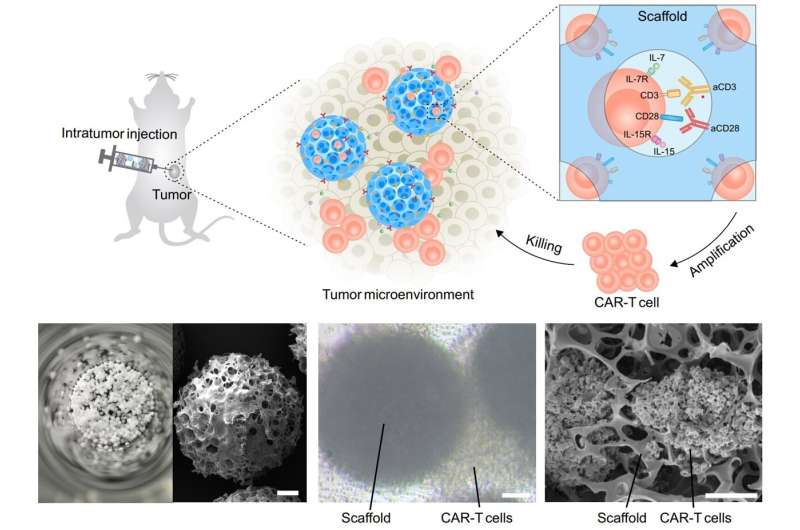This article has been reviewed according to Science X's editorial process and policies. Editors have highlighted the following attributes while ensuring the content's credibility:
fact-checked
trusted source
proofread
Lymph node-like biomaterial scaffold for augmenting CAR-T cell therapy

In a study published in the journal National Science Review, a research team aimed to enhance treatment efficacy of CAR-T cell therapy for solid tumors. The research was led by Dr. Zhen Gu and Dr. Hongjun Li from the College of Pharmaceutical Sciences at Zhejiang University, along with Dr. Jie Sun from the School of Medicine at Zhejiang University,
While demonstrating effectiveness in treating B cell-related leukemia, lymphoma, and multiple myeloma, current CAR-T therapy faces challenges in solid tumors characterized by insufficient cell infiltration, limited CAR-T persistence within the tumor, and an adverse microenvironment that hinders their activity.
"Acknowledging the pivotal role of lymph nodes as vital components of the immune system, responsible for T cell recruitment, housing, and activation. We conceived that fabricating an artificial scaffold to mimic the structure and function of a lymph node could lead to the development of a 'cell factory'."
"This envisioned cell factory, upon injection into the tumor site, holds the potential to significantly boost the in-situ activation and proliferation of pre-loaded CAR-T cells within the scaffold," said Dr. Hongjun Li.
Utilizing microfluidic technology, the researchers constructed a porous microsphere scaffold based on poly(lactic-co-glycolic acid) (PLGA). Assessment revealed an average scaffold and pore diameter of 570 μm and 25 μm, respectively, allowing each sphere to accommodate around 38,000 CAR-T cells.
Emphasizing the importance of high loading capacity and robust mechanical properties, Ziyan Liao, the first author of the study, notes, "The scaffold ability to efficiently deliver CAR-T cells to solid tumors hinges on these engineering design details."
Moreover, the research team adorned the scaffold with two pivotal signaling molecules for T cell activation—anti-CD3 and anti-CD28 antibodies—further emulating the antigen-presenting cells found in lymph nodes. Assessing CAR-T cell proliferation, they observed that the scaffold induced a remarkable 50-fold expansion in vitro and a 15-fold expansion in an implanted subcutaneous tumor model.
Notably, cells stimulated by the scaffold retained favorable killing activity even after this heightened expansion. Dr. Jie Sun stated, "This is crucial, as the diminished activity of CAR-T cells within solid tumors represents a key challenge in this therapy." The researchers substantiated their findings by demonstrating the boosted anti-tumor effects of CAR-T cells delivered through this strategy in a xenograft human cervical cancer mouse model.
"The biomaterial scaffold acts like a lymph node for constant CAR-T cell production inside the tumor, providing a new strategy to augment CAR-T therapy in solid tumor treatment. While this work is focused on CAR-T cells, this cell delivery platform could also aid in other types of therapeutic cells," concluded Dr. Zhen Gu.
More information: Ziyan Liao et al, Lymph node-biomimetic scaffold boosts CAR-T therapy against solid tumor, National Science Review (2024). DOI: 10.1093/nsr/nwae018



















